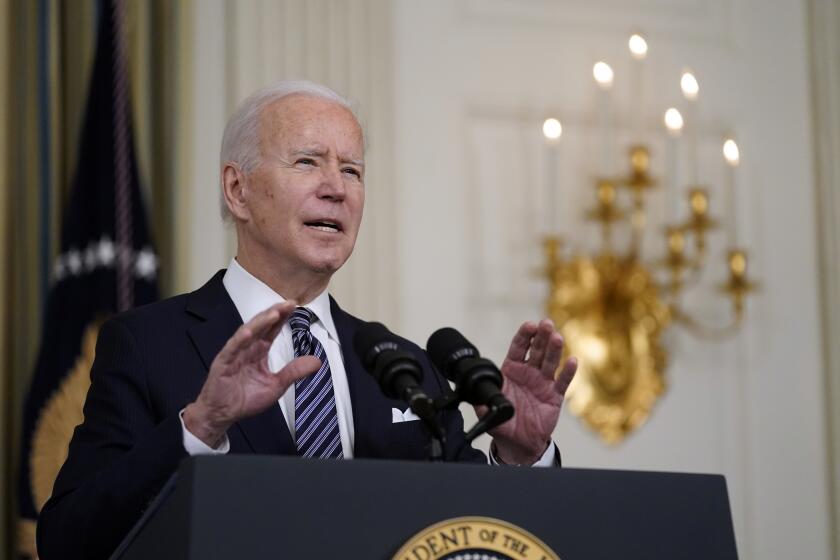Biden backs changes to filibuster; GOP vows ‘scorched earth’

- Share via
WASHINGTON — President Biden is calling for changes to the filibuster to require lawmakers to speak on the floor of the Senate to hold up a bill, while the chamber’s Republican leader warns of “scorched-earth” tactics if Democrats use their new majority to bring an end to the legislative roadblock entirely.
Biden, in an interview with ABC News’ George Stephanopoulos, restated his opposition to eliminating the filibuster but suggested he supported changes to make it more costly and time-consuming for those trying to block bills. Currently, any lawmaker can signal their intent to filibuster, setting a 60-vote threshold to advance most legislation, without ever speaking on the floor.
“I don’t think that you have to eliminate the filibuster. You have to do it what it used to be when I first got to the Senate back in the old days,” Biden said. “You had to stand up and command the floor. You had to keep talking.”
“You’ve got to work for the filibuster,” he added. “It’s getting to the point where, you know, democracy is having a hard time functioning.”
His comments Tuesday came hours after Senate Republican leader Mitch McConnell (R-Ky.) warned of a “scorched earth” landscape if Democrats end the filibuster in hopes of muscling Biden’s agenda past GOP opposition.
McConnell forecast a Senate that would all but cease to function, implying that Republicans would grind business to a halt by refusing to give consent for routine operations — from the start time for sessions, to the reading of long legislative texts, to quorum call votes.
President Biden acknowledges he’s unlikely to get support from Republican lawmakers for any type of tax hike but said he would get Democratic votes.
“Let me say this very clearly for all 99 of my colleagues: Nobody serving in this chamber can even begin — can even begin to imagine — what a completely scorched-earth Senate would look like,” McConnell said Tuesday in a Senate speech.
McConnell said the partisan gridlock of the Trump and Obama eras would look like “child’s play” compared with what’s to come.
The debate over the filibuster reignited as the Biden administration is taking a victory lap over the just-passed $1.9-trillion American Rescue Plan, the big COVID-19 relief package that was approved by Congress without a single Republican vote. Republicans acknowledged privately they are struggling to pry attention away from the bill, which appears to be popular among Americans benefiting from $1,400 cash payments, vaccine distribution and other aid, as the GOP focuses on future battles.
With the Senate evenly divided, 50-50, the rest of Biden’s priorities face a tougher climb in Congress. While the Democratic-controlled House is able to swiftly approve a long list of potentially popular bills — to expand voting rights, extend gun purchase background checks and other measures — the rules of the Senate are more cumbersome. It typically requires 60 votes to break a filibuster to advance most legislation.
Biden acknowledged that he likely won’t get GOP votes on his proposal to raise taxes on the wealthiest Americans, but said he believed Democratic votes alone could send it into law.
Senate Democratic leader Charles E. Schumer (D-N.Y.) brushed off McConnell’s remarks as a “diversion.” He said that he hopes to work with Republicans on the upcoming bills but that all options for filibuster changes are on the table.
Senate Democrats are talking privately about changing the decades-old rules for the filibuster, which allows a single senator to block a bill by objecting. In earlier eras, senators would seize the floor, speaking for hours about their objections. They also used it to stall civil rights legislation in the middle of the 20th century.
Supporters of the process say it protects the rights of the party not in power, but detractors argue it is being used to block popular bills.
President Biden is leading Democrats in selling the newly signed relief plan, with an early eye on the midterms and restoring Americans’ faith in government.
Sen. Richard J. Durbin (D-Ill.) said Tuesday that nearly 65 years after South Carolina Sen. Strom Thurmond’s record-setting 24-hour-plus filibuster over the 1957 Civil Rights Act, “the filibuster is still making a mockery of American democracy.”
It takes 51 votes to change the Senate rules and do away with the filibuster, and Democrats do not appear to have the support from within their ranks to do so, even with Vice President Kamala Harris serving as the tiebreaker. At least two Democratic senators, Joe Manchin of West Virginia and Kyrsten Sinema of Arizona, have signaled their objections, but there may be more. It wasn’t clear if the moderate Democrats would warm to the “talking filibuster” change embraced by Biden.
The Senate will be put to the test in the weeks ahead. As senators start considering the House-passed bills, Democrats will be assessing Republican willingness to participate in the legislative process by amending the bills toward eventual passage.
If Republicans simply block the bills, Democrats are expected to lean in more forcefully to try to change the rules.
Biden, in the interview, brushed back skepticism over his campaign prediction that Republicans would have an “epiphany” and begin working with Democrats on legislation.
“Give me a break. I’ve been here six weeks, pal,” said Biden, who has been in office for eight weeks. “I think that epiphany is going to come between now and 2022.”
Some Democrats want to require senators who engage in filibusters to be forced to hold the floor, as Jimmy Stewart did in “Mr. Smith Goes to Washington.” These days, senators can simply signal their filibuster, which Durbin derided as “Mr. Smith Phones It In.”
“We must change the rules,” Durbin said.
Get our L.A. Times Politics newsletter
The latest news, analysis and insights from our politics team.
You may occasionally receive promotional content from the Los Angeles Times.
McConnell warned Democrats not to take the next step, unveiling the actions he could take in retribution.
“This is an institution that requires unanimous consent to turn the lights on before noon, to proceed with a garden-variety floor speech, to dispense with the reading of a lengthy legislative text, to schedule committee business, to move even noncontroversial nominees at anything besides a snail’s pace,” he said.
Changes to the filibuster have been underway for a decade, an escalating procedural arms race alongside the nation’s rising partisanship.
Democrats did away with the filibuster rules to overcome Republican stonewalling of President Obama’s executive branch nominations and some judicial nominees.
Republicans and McConnell then escalated the process by eliminating the filibuster for Supreme Court justices, smoothing confirmation of President Trump’s three high court nominees.
More to Read
Get the L.A. Times Politics newsletter
Deeply reported insights into legislation, politics and policy from Sacramento, Washington and beyond. In your inbox twice per week.
You may occasionally receive promotional content from the Los Angeles Times.











